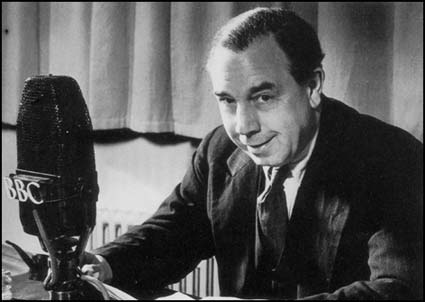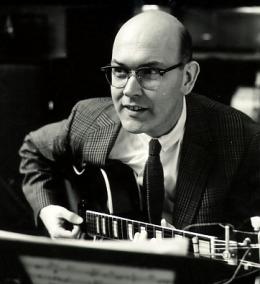In today’s Wall Street Journal drama column I report from Chicago on a rare American revival of J.B. Priestley’s An Inspector Calls. Here’s an excerpt.
* * *
If you know who J.B. Priestley was, you’re probably British. His middlebrow novels never caught on over here, but two of them, “The Good Companions” and “Angel Pavement,” sold by the truckload in his native land, and his plays are now revived there with fast-growing frequency. One of them, “An Inspector Calls,” made it to Broadway twice, in 1947 and 1994, and the second of those productions ran for 454 performances. Since then, though, Mr. Priestley, who died in 1984, has dropped completely off the screen of American renown, and Remy Bumppo Theatre Company’s production of “An Inspector Calls” appears to be the play’s first U.S. revival in 19 years.
 What of it? Well, Remy Bumppo is one of Chicago’s most interesting theater troupes, and “An Inspector Calls,” in which Mr. Priestley used an old-fashioned drawing-room detective story as a vehicle for his socialist sermonizing, regularly pops up in discussions of what chroniclers of the period refer to as “Austerity Britain.” It is, one gathers, a key document in the cultural history of postwar England, and most of today’s British drama critics also believe it to be a play of quality.
What of it? Well, Remy Bumppo is one of Chicago’s most interesting theater troupes, and “An Inspector Calls,” in which Mr. Priestley used an old-fashioned drawing-room detective story as a vehicle for his socialist sermonizing, regularly pops up in discussions of what chroniclers of the period refer to as “Austerity Britain.” It is, one gathers, a key document in the cultural history of postwar England, and most of today’s British drama critics also believe it to be a play of quality.
For all these reasons, I decided to fly out to Chicago to see what I’d been missing, and I’m glad I did. To be sure, “An Inspector Calls” is nothing remotely like a great play, but it turns out to be a fascinating period piece that is highly effective when placed in the hands of a strong cast…
Set in 1912, “An Inspector Calls” unfolds in the dining room of the Birlings, a Yorkshire family whose patriarch (Roderick Peeples) is an upwardly mobile businessman who is about to marry off his daughter (Isabel Ellison) to a nobleman (Greg Matthew Anderson). Sheila Birling and her fiancé are being toasted when a police inspector (Nick Sandys) knocks on the door, announces that he is investigating the suicide of a poor young woman of the town and starts asking awkward questions. It soon emerges that everyone in the room knew the girl–two of them intimately–and had something to do with her death.
But “An Inspector Calls” isn’t a whodunit, at least not of the ordinary sort. It’s more like a cross between “The Mousetrap” and “Waiting for Lefty,” a socialist tract in which the mysterious Inspector Goole (whose last name is more significant than is immediately apparent) endeavors to persuade each member of the family of his or her social responsibility, culminating in a fire-breathing speech delivered from center stage (yes, it’s in the script) in which he warns them that “if men will not learn that lesson, then they will be taught it in fire and blood and anguish.”
“An Inspector Calls” contains a fair amount of that sort of speechmaking, the effect of which is not unlike having dull spikes hammered into your head. But whenever Mr. Priestley climbs down from his soapbox and attends to his responsibilities as a storyteller–which is most of the time–he succeeds in turning what could easily have been a droning exercise in finger-pointing into a soundly made play….
* * *
Read the whole thing here.
The trailer for An Inspector Calls:
Archives for 2013
TT: When a great jazzman dies
Jolted by the deaths of Jim Hall, Peter O’Toole, and Ray Price–but most especially Hall–I devoted this week’s Wall Street Journal “Sightings” column to some thoughts inspired by their passing. Here’s an excerpt.
* * *
It was a hectic week for obituary writers. First came the death of the jazz guitarist Jim Hall, followed by Peter O’Toole, the legendary stage and screen actor. Finally–for such reports are famously said to come in groups of three–it was announced that Ray Price, one of country music’s most admired singers and bandleaders, had passed away shortly after entering hospice care.
 All three men were still performing long after most of us gladly call it a day. Indeed, Mr. Hall, who died on Dec. 10 at the age of 83, had made his last public appearance just two weeks earlier. As for Mr. O’Toole, he gave a late-life performance in “Venus” striking enough to win him a best-actor Oscar nomination in 2007. In that same year, Mr. Price went out on tour with Merle Haggard and Willie Nelson, and so impressed his colleagues that Mr. Haggard praised him as follows to a reporter for Rolling Stone: “I told Willie when it was over, ‘That old man gave us a goddamn singing lesson.’ He really did.”
All three men were still performing long after most of us gladly call it a day. Indeed, Mr. Hall, who died on Dec. 10 at the age of 83, had made his last public appearance just two weeks earlier. As for Mr. O’Toole, he gave a late-life performance in “Venus” striking enough to win him a best-actor Oscar nomination in 2007. In that same year, Mr. Price went out on tour with Merle Haggard and Willie Nelson, and so impressed his colleagues that Mr. Haggard praised him as follows to a reporter for Rolling Stone: “I told Willie when it was over, ‘That old man gave us a goddamn singing lesson.’ He really did.”
It’s always hard to say goodbye to an artist who has had a long, productive career, but I found Mr. Hall’s death to be especially painful, not only because of the exquisitely delicate lyricism of his playing but also because he was so fine a man. I knew him a bit, well enough to say hello after a gig, and I knew dozens of musicians who worked with him and esteemed him without limit. None of them ever had a bad word to say about him, at least not in my hearing….
* * *
Read the whole thing here.
TT: Almanac
“Nothing costs so much as what is given us.”
Thomas Fuller, Gnomologia
TT: So you want to see a show?
Here’s my list of recommended Broadway, off-Broadway, and out-of-town shows, updated weekly. In all cases, I gave these shows favorable reviews (if sometimes qualifiedly so) in The Wall Street Journal when they opened. For more information, click on the title.
BROADWAY:
• A Gentleman’s Guide to Love & Murder (musical, PG-13, reviewed here)
• Macbeth (Shakespeare, PG-13, closes Jan. 12, reviewed here)
• Matilda (musical, G, nearly all shows sold out last week, reviewed here)
• No Man’s Land/Waiting for Godot (drama, PG-13, playing in rotating repertory through Mar. 2, most shows sold out last week, reviewed here)
• Once (musical, G/PG-13, reviewed here)
• Twelfth Night (Shakespeare, G/PG-13, closes Feb. 16, all performances sold out last week, reviewed here)
OFF BROADWAY:
• Avenue Q (musical, R, adult subject matter and one show-stopping scene of puppet-on-puppet sex, reviewed here)
• The Commons of Pensacola (drama, PG-13, closes Jan. 26, reviewed here)
• The Fantasticks (musical, G, suitable for children capable of enjoying a love story, reviewed here)
• Fun Home (musical, PG-13, closes Jan. 12, reviewed here)
• Hamlet/Saint Joan (drama, G/PG-13, remounting of off-Broadway production, performed in rotating repertory, closes Feb. 2, original production reviewed here)
• Juno and the Paycock (drama, G/PG-13, far too dark for children, closes Jan. 26, reviewed here)
• The Night Alive (drama, PG-13, closes Jan. 26, reviewed here)
IN GLENCOE, ILL.:
• Port Authority (drama, PG-13, closes Feb. 16, reviewed here)
CLOSING SOON IN SARASOTA, FLA.:
• Show Boat (musical, G, remounting of Goodspeed Musicals production, suitable for bright children, closes Dec. 29, original production reviewed here)
CLOSING SOON ON BROADWAY:
• Annie (musical, G, closing Jan. 5, nearly all shows sold out last week, reviewed here)
CLOSING NEXT WEEK OFF BROADWAY:
• Family Furniture (drama, PG-13, closes Dec. 24, reviewed here)
TT: Almanac
“There is one postulate on which pessimists and optimists agree. Both their arguments assume it to be self-evident that life is good or bad according as it does or does not bring a surplus of agreeable feeling.”
Herbert Spencer, The Data of Ethics
TT: Snapshot
Avi Avital plays Joseph Szigeti’s violin arrangement of Bartók’s Hungarian Folk Tunes on mandolin, accompanied by Alice Sara Ott:
(This is the latest in a series of arts-related videos that appear in this space each Monday and Wednesday.)
TT: Almanac
“A pessimist is a man who thinks everybody as nasty as himself, and hates them for it.”
George Bernard Shaw, An Unsocial Socialist
TT: Lookback
From 2003:
It is an aspect of American manners that our politicians emulate our advertisers by engaging in the 24-hour robotic spin that determines their every public utterance: “So, Senator, how do you explain the presence of that cheap hooker in your hotel room?” “When I am elected president, the failed economic policies of the current administration will be reversed, thus reducing the burden on the middle class!” (No doubt this phenomenon is in large part a function of the takeover of the political process by lawyers.) In the process, they debase the culture as well, precisely because they’re not fooling anybody. When the men and women who lead us, or wish to lead us, engage in such shameless and transparent verbal trickery, they are going far beyond the necessary quotient of euphemism that lubricates everyday human transactions. They are proving themselves consistently untrustworthy in small things. Why, then, should we trust them in large ones?…
Read the whole thing here.
